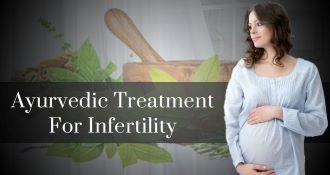According to Ayurveda, infertility is a condition in which a person is unable to contribute to conception due to a biological impairment brought on by a variety of circumstances. The inability to carry a pregnancy to term in women is another way to define infertility.
Infertility in both men and women has become a prevalent issue, which can be attributed to causative factors such as high levels of stress, poor dietary choices, and a sedentary lifestyle. Additionally, couples are looking forward to spending a lot of money on reproductive treatments. In this situation, it makes sense to turn to the conventional knowledge that Ayurveda provides to treat the issue of infertility holistically and speed up the conception .Travancore Ayurveda provide you with the best treatment for infertility.
Male Infertility
Male infertility is brought on by several circumstances, including unhealthy lifestyle and dietary choices, exposure to specific environmental conditions, and defective sperm production or function. Ayurveda developed the remedies and methods to treat male infertility thousands of years ago after realizing the issue. In Travancore Ayurveda, we combine these age-old, conventional treatments with advice on maintaining a healthy food and way of life to aid in conception.
Causes of Infertility in Men
The following are the reasons behind male infertility, according to Ayurveda.
- Seminal morbidity may result from chronic and excessive use of dry, bitter, salty, astringent, and acidic foods.
- Late-night sleep can vitiate Rakta and Pitta dosha in the body, which reduces the quantity and quality of Shukra dhatu.
- Psychological influences Anxiety, anger, sadness, a lack of mutual love, fear, and other psychological problems can all contribute to infertility.
Ayurvedic treatment for male infertility
Panchakarma Therapy: Panchakarma therapy for infertility, one of Ayurveda’s most recognized treatments, strives to restore the dosha balance and foster general well-being. Basti and Shodhana are a couple of the Panchakarma therapies that are suggested for treating male infertility.
Yogasana: The following yoga poses, such as Padmasana, Bhujangasana, Sarvangasana, Paschimottanasana, and Parivrtta trikonasana, can assist to maintain balance in the mind, body, and spirit and avoid infertility.
Female Infertility
Infertility in women is frequently brought on by hormone imbalances, physical ailments, lifestyle choices, and environmental factors.
The status of the Shukra dhatu, or reproductive tissues, affects both men’s and women’s reproductive health, according to Ayurveda. Women’s Shukra dhatu, which controls ovum production, can be impacted by a variety of conditions, including poor digestion, an unbalanced diet, physical or mental illness, and other conditions that might impede the reproductive system.
The three doshas that control the female reproductive system—Sadhaka Pitta, Prana Vata, and Apana Vata—are also significant, according to Ayurveda. As a result, the goal of Ayurvedic treatment for infertility is to balance these doshas and cure the body from the inside out.
Ayurvedic Treatment for Women’s Infertility
Some of the natural treatments used to enhance ovulation and treat female infertility include:
- Fertility Massage: This massage is given to increase the blood flow carrying oxygen to the eggs and to replenish the uterine tissues and blood that have become stagnant. Additionally, it removes any blockage in the fallopian tubes’ passage.
- Eating Healthy: To avoid hormonal imbalance, it is advised to choose organic foods as much as possible that are pesticide-free. It is recommended to eat foods high in folate since it aids in the body’s ability to create new cells and reduces the risk of birth abnormalities.
- Exercise: Regular exercise keeps the body healthy and maintains hormone balance. Additionally, it raises the likelihood of conception.
- Yoga: Yoga helps with fertility concerns as well as stress reduction. Nadi Shodhan Pranayama and Bhramari Pranayam are two yoga pose for women’s reproductive health care. Ayurvedic treatments for ovulation concentrate on transporting the nutrients from food to efficiently nourish the Shukra dhatu since the reproductive tissue is primarily responsible for causing infertility in women when it is malnourished.
- Vamanam: Aids in the elimination of vitiated kapha dosha from the body. Vamanam therapy is a crucial detoxifying therapy as a result.
- Shirodhara: Utilizing medicated oils, Shirodhara therapy helps women with hormone abnormalities. Basti is yet another treatment that makes use of medicinal oils. It enhances ovum quality and purges all doshas.
- Shodhana: One of the primary panchakarma therapies, it aids in the removal of toxins from the body, opens up physiological channels, and promotes good blood circulation. Additionally, it improves uterine, tubular, and ovarian function and treats reproductive issues.
Why Choose Travancore Ayurveda for the treatment of Infertility?
By enhancing the quality of the ovum and reproductive system so that correct fertilization and implantation may occur, Travancore Ayurveda offers well-designed treatment plans for infertility in women and men. To promote higher-quality sperm production and sperm motility, stress management treatments are also incorporated.
The Ayurvedic treatments at Travancore Ayurveda are tailored to each patient’s unique bodily composition and are highly effective in treating the causes of infertility. Whatever the issue, you can start down the path to a healthy life and enhance your general health with our Ayurvedic remedies. We also provide detox ayurvedic treatments in Bangalore,Hyderabad and vizag.
Read our more blogs at:-



